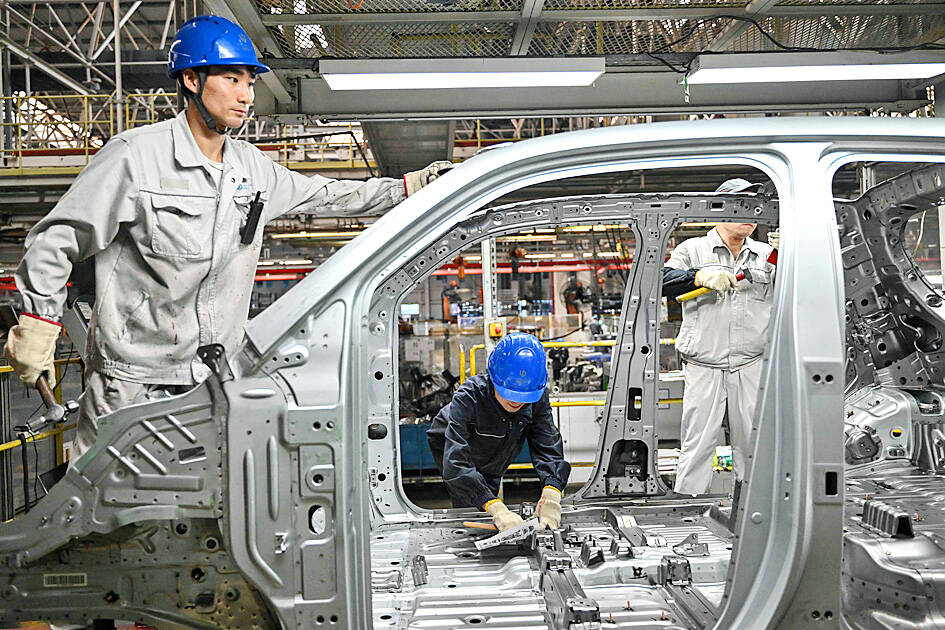The EU yesterday voted to impose tariffs as high as 45 percent on electric vehicles (EVs) from China in a move set to increase trade tensions with Beijing.
The European Commission, the bloc’s executive arm, can now proceed with implementing the duties, which would last for five years. Ten member states voted in favor of the measure, while Germany and four others voted against, and 12, including Spain, abstained, sources familiar with the results said.
The decision by the EU comes after an investigation found that China unfairly subsidized its industry. Beijing denies that claim and has threatened its own tariffs on the European dairy, brandy, pork and automobile sectors.

Photo: AFP
The bloc is actively trying to reduce its dependencies on China, with former European Central Bank president Mario Draghi warning last month that “China’s state-sponsored competition” was a threat to the EU that could leave it vulnerable to coercion. The EU, which did 739 billion euros (US$815 billion) in trade with China last year, was split on whether to move forward with the duties.
The EU and China would continue negotiations to find an alternative to the tariffs. The two sides are exploring whether an agreement can be reached on a mechanism to control prices and volumes of exports in place of the duties.
“The EU and China continue to work hard to explore an alternative solution that would have to be fully WTO-compatible, adequate in addressing the injurious subsidization established by the commission’s investigation, monitorable and enforceable,” the commission said in a press release announcing the decision.
The new tariff rates would be as high as 35 percent for EV manufacturers exporting from China. The duties would be on top of the existing 10 percent rate.
Chinese EV makers would have to decide whether to absorb the tariffs or raise prices, at a time when slowing demand at home is squeezing their profit margins. The prospect of duties has prompted some Chinese automakers to consider investing in factories in Europe, which might help them dodge tariffs.
A statement from Geely Holding Group Co (吉利控股集團), which controls Sweden’s Volvo and UK’s Lotus Cars, criticized the decision, saying it was “not constructive and may potentially hinder EU-China economic and trade relations, ultimately harming European companies and consumer interests.”
The additional tariffs already have slowed Chinese automakers’ momentum in Europe, with their sales plunging 48 percent in August to an 18-month low. The region is a desirable destination for the nation’s manufacturers because EVs sell in relatively high numbers and at much more robust prices than other export markets.
The share of EVs sold in the EU that were made in China climbed from about 3 percent to more than 20 percent in the past three years. Chinese brands accounted for about 8 percent of that market share, as international companies that export from China, including Tesla Inc, taking up the rest.

The US dollar was trading at NT$29.7 at 10am today on the Taipei Foreign Exchange, as the New Taiwan dollar gained NT$1.364 from the previous close last week. The NT dollar continued to rise today, after surging 3.07 percent on Friday. After opening at NT$30.91, the NT dollar gained more than NT$1 in just 15 minutes, briefly passing the NT$30 mark. Before the US Department of the Treasury's semi-annual currency report came out, expectations that the NT dollar would keep rising were already building. The NT dollar on Friday closed at NT$31.064, up by NT$0.953 — a 3.07 percent single-day gain. Today,

‘SHORT TERM’: The local currency would likely remain strong in the near term, driven by anticipated US trade pressure, capital inflows and expectations of a US Fed rate cut The US dollar is expected to fall below NT$30 in the near term, as traders anticipate increased pressure from Washington for Taiwan to allow the New Taiwan dollar to appreciate, Cathay United Bank (國泰世華銀行) chief economist Lin Chi-chao (林啟超) said. Following a sharp drop in the greenback against the NT dollar on Friday, Lin told the Central News Agency that the local currency is likely to remain strong in the short term, driven in part by market psychology surrounding anticipated US policy pressure. On Friday, the US dollar fell NT$0.953, or 3.07 percent, closing at NT$31.064 — its lowest level since Jan.

The New Taiwan dollar and Taiwanese stocks surged on signs that trade tensions between the world’s top two economies might start easing and as US tech earnings boosted the outlook of the nation’s semiconductor exports. The NT dollar strengthened as much as 3.8 percent versus the US dollar to 30.815, the biggest intraday gain since January 2011, closing at NT$31.064. The benchmark TAIEX jumped 2.73 percent to outperform the region’s equity gauges. Outlook for global trade improved after China said it is assessing possible trade talks with the US, providing a boost for the nation’s currency and shares. As the NT dollar

The Financial Supervisory Commission (FSC) yesterday met with some of the nation’s largest insurance companies as a skyrocketing New Taiwan dollar piles pressure on their hundreds of billions of dollars in US bond investments. The commission has asked some life insurance firms, among the biggest Asian holders of US debt, to discuss how the rapidly strengthening NT dollar has impacted their operations, people familiar with the matter said. The meeting took place as the NT dollar jumped as much as 5 percent yesterday, its biggest intraday gain in more than three decades. The local currency surged as exporters rushed to